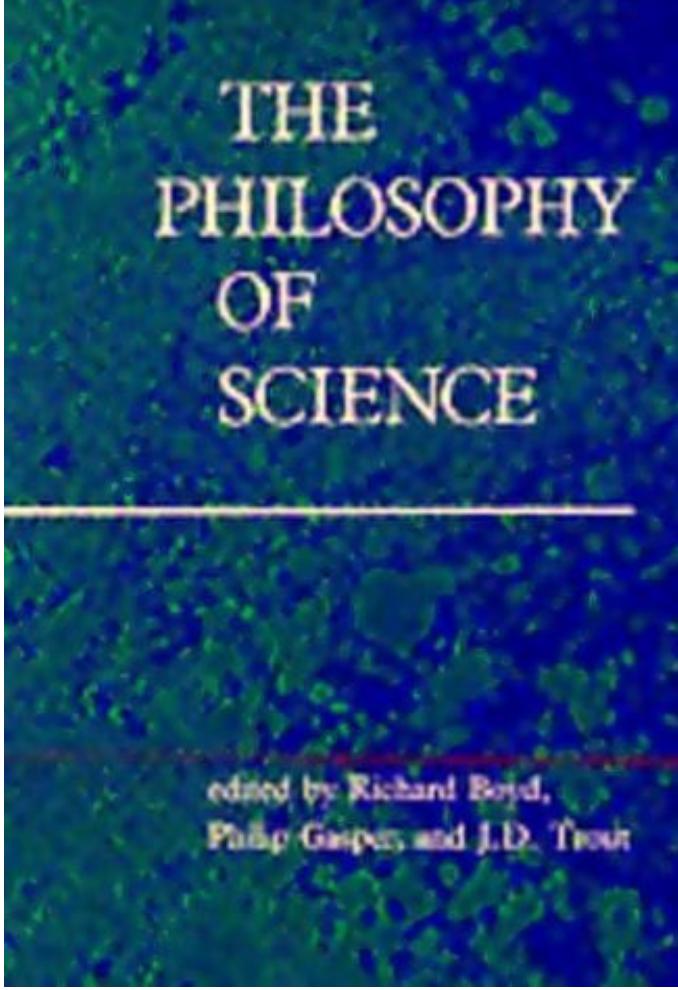

Most ebook files are in PDF format, so you can easily read them using various software such as Foxit Reader or directly on the Google Chrome browser.
Some ebook files are released by publishers in other formats such as .awz, .mobi, .epub, .fb2, etc. You may need to install specific software to read these formats on mobile/PC, such as Calibre.
Please read the tutorial at this link. https://ebooknice.com/page/post?id=faq
We offer FREE conversion to the popular formats you request; however, this may take some time. Therefore, right after payment, please email us, and we will try to provide the service as quickly as possible.
For some exceptional file formats or broken links (if any), please refrain from opening any disputes. Instead, email us first, and we will try to assist within a maximum of 6 hours.
EbookNice Team

Status:
Available4.4
22 reviews
ISBN 10: 0262521563
ISBN 13: 978-0262521567
Author: Richard Boyd, Philip Gasper, J.D. Trout
Readings that chart the rise and decline of logical positivism and the emergence of a new consensus, emphasizing the relation between theoretical and applied questions.
The more than forty readings in this anthology cover the most important developments if the past six decades, charting the rise and decline of logical positivism and the gradual emergence of a new consensus concerning the major issues and theoretical options in the field. The editors have included articles on all the major special sciences and emphasize the relation between the more theoretical and applied questions.
Part One deals with basic theoretical issues: confirmation, semantics, and the interpretation of theories; causation and explanation; and reductionism and the unity of science. In Part Two, these relatively abstract themes are illustrated and examined further in light of issues in the various special sciences including physics, biology, psychology, and social science.
Introductory Essay – Richard Boyd
Positivism and Realism – Moritz Schlick
The Operational Character of Scientific Concepts – Percy Bridgman
Empiricist Criteria of Cognitive Significance: Problems and Changes – Carl Hempel
Empiricism, Semantics, and Ontology – Rudolf Carnap
Selections from The Logic of Scientific Discovery – Karl Popper
A. Scientific Method
B. Falsificationism versus Conventionalism
C. The Empirical Basis
The 'Corroboration' of Theories – Hilary Putnam
Scientific Revolutions – Thomas Kuhn
A. The Essential Tension
B. The Nature and Necessity of Scientific Revolutions
Natural Kinds – W. V. O. Quine
Explanation and Reference – Hilary Putnam
To Save the Phenomena – Bas van Fraassen
On the Current Status of Scientific Realism – Richard Boyd
A Confutation of Convergent Realism – Larry Laudan
Experimentation and Scientific Realism – Ian Hacking
The Natural Ontological Attitude – Arthur Fine
Feminism and Science – Evelyn Fox Keller
Section II – Causation and Explanation
Introductory Essay – Philip Gasper
Laws and Their Role in Scientific Explanation – Carl Hempel
The Pragmatics of Explanation – Bas van Fraassen
Explanatory Unification – Philip Kitcher
Observations, Explanatory Power, and Simplicity: Toward a Non-Humean Account – Richard Boyd
The Reality of Causes in a World of Instrumental Laws – Nancy Cartwright
Section III – Reductionism and the Unity of Science
Introductory Essay – J.D. Trout
Logical Foundations of the Unity of Science – Rudolf Carnap
Unity of Science as a Working Hypothesis – Paul Oppenheim and Hilary Putnam
Special Sciences – Jerry Fodor
Reductionism – Alan Garfinkel
PART II
Section I – The Philosophy of Physics
Introductory Essay – J.D. Trout
Selections from The Philosophy of Space and Time – Hans Reichenbach
The Epistemology of Geometry – Clark Glymour
Is The Moon There When Nobody Looks? Reality and the Quantum Theory – N. David Mermin
Metaphysical Problems in the Foundations of Quantum Mechanics – Abner Shimony
Is Scientific Realism Compatible with Quantum Physics? – Arthur Fine
Section II – The Philosophy of Biology
Introductory Essay – Philip Gasper
1953 and All That: A Tale of Two Sciences – Philip Kitcher
Artifact, Cause, and Genic Selection – Elliott Sober and Richard Lewontin
The Return of the Gene – Kim Sterelny and Philip Kitcher
Section III – The Philosophy of Psychology
Introductory Essay – J.D. Trout
Eliminative Materialism and the Propositional Attitudes – Paul Churchland
Three Kinds of Intentional Psychology – Daniel Dennett
Methodological Solipsism Considered as a Research Strategy in Cognitive Psychology – Jerry Fodor
Narrow Taxonomy and Wide Functionalism – Patricia Kitcher
Individualism and Psychology – Tyler Burge
Section IV – The Philosophy of Social Science
Introductory Essay – Philip Gasper
Value-judgments in Social Science – Max Weber
Section IV – The Philosophy of Social Science (tiếp tục)
Methodological Individualism and Social Tendencies – John Watkins
Fact and Method in the Social Sciences – Richard W. Miller
Marx and the Objectivity of Science – Peter Railton
the philosophy of science
what are the philosophy of science
what are the philosophy of integrated science
what are the characteristics of philosophy of science
what are the branches of social science and philosophy
Tags: Richard Boyd, Philip Gasper, Trout, The Philosophy